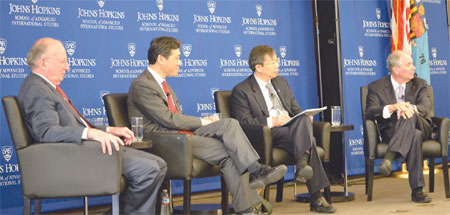China's financial reforms 'not tough one'
Spring time in Washington means the annual meeting of the World Bank and International Monetary Fund, and some of the world's leading financial figures gathered on Thursday for a discussion on China's financial reforms and their impact on the world.
Yi Gang, deputy governor of the People's Bank of China, told a packed room of economists and China experts that China's financial reforms include three aspects: Opening the country's market domestically and internationally, market reform, and strengthening financial regulation, as defined in last year's Third Plenum.
"Over the past 35 years, China has been engaging in all factors of reforms, among which the financial sector is a very important one," said Yi, who also serves as director of the State Administration of Foreign Exchange.
Yi made his comments as a panelist at a forum sponsored by the School of Advanced International Studies (SAIS) of John Hopkins University.
To Li, China's financial reform is not the tough one.
"China's financial reform is one of the easiest reforms, comparing with traffic controls and property tax issues; financial reform is technical," said Li, adding that financial reform mainly includes the reform of commercial banks and capital account convertibility.
Yi, however, acknowledged that there are some difficulties with China's financial reform. He said liberalizing interest rates faces a challenge brought by some micro foundations that are not ready, which mean some firms and corporations are not responding to interest rates.
"Financial reform should simultaneously push forward interest rates, exchange rates and capital account convertibility," said Yi, who obtained a PhD in economics from the University of Illinois in 1986 and taught at Indiana University-Purdue University Indianapolis (IUPUI) for a few years before returning to China.
He stressed the profound transformation that he said Chinese banks have gone through in recent years.
"It is amazing that 15 years ago China's entire banking sector was on the verge of bankruptcy. But now four or five of the world's largest banks in terms of assets, capital and profit are from China," said Yi, who is attending the World Bank and IMF meeting in Washington.
Yi's comments were echoed by Stephen Schwarzman, chairman of Blackstone Group, who also was on the panel.
"Chinese banks are incredibly large and profitable," Schwarzman said, adding that "Chinese banks are also tightly controlled because they are so central to the Chinese economy."
He said it would be very interesting to see these large Chinese banks step out of their territories in China and start exploring the global market.
Schwarzman has set up the $300 million Schwarzman Scholarship at Tsinghu University to attract students from other countries to study and gain a deep understanding of China as future world leaders.
Contact the writers at [email protected] and [email protected]
|
From left: SAIS professor Pieter Botellier, Tsinghua University professor David Li, Deputy Governor of People's Bank of China Yi Gang and Blackstone Group Stephen Schwarzman listen to a question from the audience during a forum event at SAIS in Washington on Thursday. Liu Chang / China Daily |

























